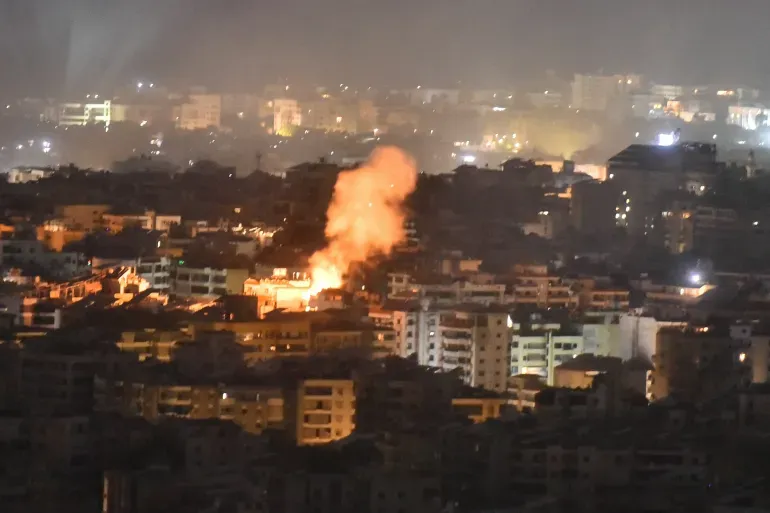Escalating Tensions in the Middle East: The Global Stakes of Israel's Aggressive Policies

The ongoing developments in the Middle East have created a highly volatile situation, with global implications that cannot be ignored. Israel’s increasing military actions, led by Prime Minister Benjamin Netanyahu’s government, are driving the region toward deeper instability. These aggressive policies, originally focused on Gaza, have now expanded into broader conflicts involving Lebanon, Syria, Yemen, and Iran. As the violence escalates, the threat of a much larger conflict looms, one that could have consequences far beyond the Middle East.
Israel's Expanding Military Campaigns
Israel’s continued assault on Gaza, condemned by many human rights organizations for its severe humanitarian impact, is a tragic chapter in a long history of military actions against Palestinians. Entire neighborhoods have been destroyed, and civilians—many of them women and children—have been killed or displaced. Despite international criticism, global intervention has been limited, allowing the situation to worsen.
Prime Minister Netanyahu’s government, under the guise of national security, has expanded military operations into Lebanon, conducting airstrikes and incursions. In Syria, Israeli airstrikes continue to target infrastructure and military positions, further destabilizing a country already ravaged by years of civil war. Israel’s covert operations in Iran, including sabotage and targeted killings of nuclear scientists, have only increased tensions, bringing the region closer to open conflict.
This aggressive posturing is not limited to Gaza or Syria. Israel’s lesser-publicized operations in Yemen contribute to the humanitarian disaster there, adding to the chaos in a region already suffering from years of war and instability.
The Expansionist Agenda of Netanyahu’s Government
Israel’s current policies seem to be driven by a vision of territorial expansion, echoing colonial ambitions of past eras. Netanyahu’s actions suggest a strategy aimed at weakening neighboring Arab nations while expanding Israel’s influence. Lebanon, Syria, and even Egypt are now in Israel’s strategic sights, and the possibility of future confrontations with regional powers like Turkey or Iran cannot be ruled out.
This expansionist approach is dangerous, not only because of the immediate military implications but because it risks igniting a much larger conflict. No country, regardless of military superiority, can pursue unchecked territorial ambitions without provoking resistance. Israel’s continued aggression has created a volatile situation that could lead to a regional war, with devastating consequences for both the Middle East and the broader international community.
The International Community’s Failure to Act
The global response to Israel’s actions has been tepid, at best. The United Nations, which is supposed to act as a mediator for global peace, has largely failed to intervene in any meaningful way. Resolutions condemning Israel’s actions are frequently blocked or watered down by powerful nations with vested interests in maintaining Israel’s strategic position. This lack of decisive action is viewed by many as tacit approval of Israel’s policies, further emboldening Netanyahu’s government to continue its aggressive campaigns.
The failure of the international community to hold Israel accountable is not just a diplomatic shortcoming; it is a failure of global governance. As Israel continues to expand its military operations and provoke its neighbors, the region edges closer to a full-scale war—one that could have global ramifications.
The Growing Threat of Regional and Global Conflict
The broader implications of Israel’s aggressions are alarming. Key regional powers like Iran and Turkey are unlikely to remain passive in the face of continued Israeli provocations. Iran, with its network of allies and militia groups across the Middle East, could escalate its confrontations with Israel, turning the conflict into a larger regional war. Turkey, which has its own strategic interests in the region, could also become involved, further complicating an already fragile situation.
Beyond the Middle East, the risk of global conflict grows. Russia, with significant military interests in Syria, and China, with strategic investments in the region, may not stand idle as tensions escalate. The United States, Israel’s most important ally, could find itself in a difficult position, trying to balance its support for Israel with the need to stabilize an increasingly volatile region. If the situation continues to deteriorate, the world could face a crisis of immense proportions, potentially drawing in major powers and creating the conditions for a broader global conflict.
The Urgent Need for International Action
Time is running out to prevent this dangerous scenario from unfolding. The international community must recognize the gravity of the situation and take immediate steps to halt Israel’s aggressive policies. The UN, despite its recent failings, remains a critical platform for dialogue and conflict resolution. It must push for a cessation of hostilities and bring all parties to the negotiation table to find a sustainable solution to the ongoing crisis.
Regional countries, particularly Lebanon, Syria, Jordan, and Egypt, need international support to resist Israel’s provocations and maintain stability. Diplomatic efforts must be intensified, with the goal of brokering a ceasefire and initiating peace talks. Without a coordinated response from the global community, the conflict could spiral out of control, with devastating consequences for millions of people.
A Precarious Future for the Middle East
The future of the Middle East hangs in the balance. Israel’s actions are not just acts of military aggression but part of a broader expansionist strategy that threatens to plunge the region into chaos. If left unchecked, these policies could spark a conflict that spreads far beyond the Middle East, with the potential to involve major global powers and escalate into a catastrophic war.
The international community must act now to prevent this disaster. Israel’s aggressive expansionism must be curtailed, and a concerted effort must be made to bring peace to the region. The world cannot afford to ignore the warning signs. If the situation continues to escalate, the consequences could be disastrous—not just for the Middle East but for global peace and security.
It is a matter of international urgency, and failure to act could lead to a conflict that engulfs the world. The stakes are too high for inaction.
